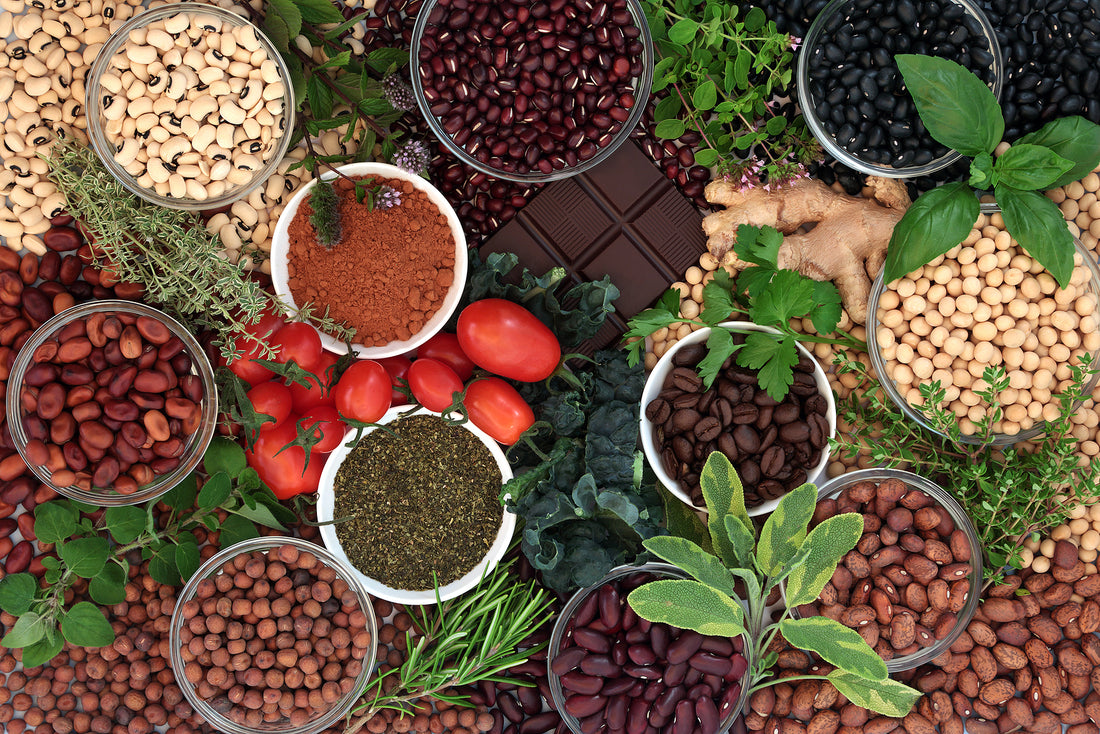You've decided it's time to taking your health back into your hands — congratulations! You're on the path towards better energy, better sleep, and hopefully better mobility.
But there’s a lot to consider, especially regarding food and eating.
You have your bases covered: prioritizing whole grains and quality protein while cutting out trans fats and heavily processed foods. Meanwhile, you’re juggling the tasks of drinking enough water and keeping sugar out of the cabinets. But are you getting enough fiber?
The average American doesn’t get nearly enough fiber in their diet. Most only get around 15 grams, while the daily recommended about is between 25 – 35 grams of dietary fiber (1).
Why is fiber important for gut and overall health, and what are ways you can get more of it? By focusing on fiber, you're doing yourself a favor in more ways than just digestion.
Let’s first talk about what fiber is and why it’s important.
Related article: GutBio Max: 3 Key Elements to Core Health (10)
Types of Fiber
A term that describes the part of a plant that doesn’t break down, fiber helps keep you healthy in a variety of different ways.
But did you know that not all fibers are created equal? When it comes to food, nutrition, and how your body processes these, there are many different fiber types (2), like:
- Beta-glucans
- Cellulose/hemicellulose
- Guar gum
- Inulin (oligofructose, oligosaccharides, fructooligosaccharides)
- Lignans
- Pectins
- Psyllium husk
- Resistant starch
Each of these types of fibers fall into one of two categories: Soluble and insoluble.
What’s the difference between soluble and insoluble fiber? Soluble fiber means it can dissolve in water over a period of time. Insoluble fiber retains its original structure and does not dissolve in water
Amazing Health Benefits of Fiber
Why is fiber important to your health? In soluble forms, this indigestible material can turn into a gel-like substance and is fermentable. This is because it acts as food for gut bacteria that break down. Insoluble fibers that are not broken down by bacteria are called nonfermentable. These travel through your colon intact, adding bulk and weight to your stool, making it easier to pass.
Not only does it help your plays a critical role in several body functions, including
- Regulates Bowel Movements: As food moves through the digestive tract, nutrients and water is extracted and waste products are moved toward the colon. Both soluble and insoluble fiber helps bulk waste up to make the transition easier, and increase the frequency with no negative side effects (4). Constipation and loose, watery stools can be a sign that you need more fiber in your diet.
- Lowers LDL Cholesterol Levels: Not only does it help your body form and eliminate waste, but high-fiber diets also help your body absorb low-density (LDL) cholesterol more effectively, encouraging healthy cholesterol levels overall (5).
- Aids in Weight-Loss: Because fiber doesn’t break down, it can slow down digestion and keep you fuller longer. This can help you consume fewer calories in general, which can help you lose weight (6).
- Reduces your risk for Type 2 Diabetes: Refined carbohydrates and simple sugars spike your blood sugar levels. For those diagnosed with diabetes, their body already has trouble producing the insulin needed to balance the current blood sugars in the blood. Studies suggest that eating more fiber can help slow down the release of sugar into the bloodstream, as fiber won’t produce the spike in blood sugars like simple carbohydrates will (7).
- May Protect Against Heart Disease: Besides lowering cholesterol and blood pressure, high-fiber diets have also been associated with lower blood pressure. These can all contribute to your risk of developing heart disease (8).
How to Get More Fiber into Your Diet
If you want to increase your fiber intake, you have several options.
Food: Wholesome, natural foods will always be your best first choice when it comes to getting the nutrients you need. Include at least one serving of some type with each meal, mixing it up to find new and unique flavor combinations.
Foods with soluble fiber include:
- oatmeal
- blueberries
- nuts
- chia seeds
- beans
- lentils
Similarly, foods that contain insoluble fibers include:
- whole wheat and wheat bran products
- brown rice
- legumes
- quinoa
- leafy greens
- fruits with edible skins, such as pears and apples
Making sure you eat several of these types of foods per day will help you meet your daily fiber needs.
Supplements: While they lack the necessary vitamins, minerals, and other nutrients found in food, occasionally there may be the need for fiber supplements. If you’re meeting the recommended daily amount and still have irregular bowel movements, abdominal discomfort, no weight loss progress despite following a strategic meal plan, speak with your healthcare provider to see if a fiber supplement is right for you.
Snack smart: Keep some whole-wheat crackers, toasted chickpeas or trail mix on hand to keep you going until mealtime.
Pro tip: You can also add bran, flax, and oats to baked goods like muffins, pancakes, and bread to bulk up the fiber content.
Summary
Healthy living requires healthy eating habits. And whether you’re new to the journey or a seasoned professional, there’s always room for improvement.
Fiber is a staple in a healthy diet, and many of us across the nation don’t get the daily recommended amount. But through planning and experimenting, you can find fun ways to add more fiber and enjoy the benefits of heart health, lower body weight, better digestion, and more vibrant health.
Curious to learn more about gut health? See what our customers have to say about our several gut health supplements (9)!
References & Disclaimers
1. https://nutrition.org/most-americans-are-not-getting-enough-fiber-in-our-diets/
2. https://www.hsph.harvard.edu/nutritionsource/carbohydrates/fiber/
3. https://www.ucsfhealth.org/education/increasing-fiber-intake
4. https://www.ncbi.nlm.nih.gov/pmc/articles/PMC3544045/
5. https://www.nejm.org/doi/full/10.1056/NEJM199307013290104
6. https://pubmed.ncbi.nlm.nih.gov/31174214/
7. https://www.sciencedirect.com/science/article/pii/S1756464621001493
8. https://bmcmedicine.biomedcentral.com/articles/10.1186/s12916-022-02328-x
9. https://karamd.com/collections/all-products
10. https://karamd.com/blogs/health/gutbio-max-3-key-elements-for-core-health
✝✝This noted statement is based on independent research and is not necessarily the opinion of the author
